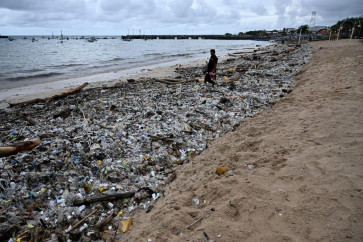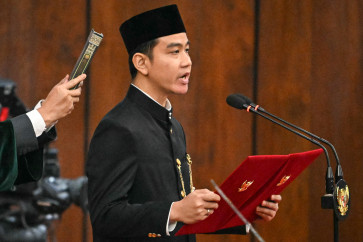Science in the land where gods reign
A few days after the Sumatra earthquake, a friend of mine told me that she was lost for words when her daughter asked her: "Mother, why did God send us an earthquake? Why should we worship a God who sends us natural disasters and miseries relentlessly?" It is not only children who ask this kind of question in the aftermath of natural disasters, especially ones on a massive scale like the Aceh tsunami and the more recent Sumatra earthquake
Change text size
Gift Premium Articles
to Anyone

A
few days after the Sumatra earthquake, a friend of mine told me that she was lost for words when her daughter asked her: "Mother, why did God send us an earthquake? Why should we worship a God who sends us natural disasters and miseries relentlessly?"
It is not only children who ask this kind of question in the aftermath of natural disasters, especially ones on a massive scale like the Aceh tsunami and the more recent Sumatra earthquake.
Many say that God is angry with us. They say the Indonesians deserve the punishment because of their sins. Clerics and priests urge us to ask forgiveness from God. In the words of Muslim clerics, taubat nasuhah (an act of contrition to God) is what the Indonesians have to do.
Others confidently say natural disasters are signs the apocalypse has come nearer. To make matters worse, some of our media give too much space to upholders of theological paradigms which explain earthquakes, instead of asking scientists to provide a scientific explanation.
When it comes to the list of "sins" that those clerics and priest refer to, nobody will dispute it. It is our personal freedom to choose whether we want to believe theological or scientific paradigms. However, it is reckless to say natural disasters are God's decision.
I wonder how many of us are still surprised that we often hear that donations and funds for the victims are stolen or embezzled. Recent news from the West Sumatra earthquake is that many ethnic Chinese reported that they were extorted.
Crime against disaster victims reflects that our disaster management is extremely poor despite the fact that Indonesia lies in one of the most naturally volatile regions in the world. Theological paradigms in explaining earthquakes, tsunamis or volcanic eruptions are partly responsible for the inefficiency of our disaster management.
More than a hundred years after Krakatoa erupted, theological paradigms are still dominant in encouraging the mind-set of yielding to God (pasrah pada Tuhan). When Krakatoa erupted, the locals said urang alijeh (the Sea God) was angry, and now, facing the threats of natural calamities, gods are still in the spotlight.
Thus, when it comes to disaster management, the focus is normally on actions after the event.
Theological paradigm, with its "pasrah" mind-set, blocks the capacity to learn the "tricks" of how to live in regions prone to natural disasters. Roughly a year before the earthquake in Padang, local newspapers reported that soon there was to be a project named Padang Bay City.
Huge concrete buildings and monuments along the coast were planned to be the landmark of Padang. The fact that the Western coast of Sumatra is very prone to earthquakes and tsunamis was not even considered.
We are not alone in being prone to earthquakes and tsunamis. Other cities have learnt to construct "earthquake tolerant" buildings, and these design principles are readily available for those who want them.
The "pasrah" mind-set has denied the urgency of establishing a proper mapping of zones prone to disasters within the country. Regulations concerning building materials permitted in these zones are never considered as serious issues.
Within the last five years, several provincial capitals along the Western coast of Sumatra and also Jakarta have been struck by earthquakes or tsunamis. The "pasrah" mind-set hinders the capability to think outside the box. Thus ideas, such as relocating the centre of administration to a safer location, are denied.
The inefficiency of the process of helping victims in West Sumatra is because the capital, Padang, was badly hit. Both provincial and city administrations, who are supposed to manage relief efforts and to maintain law and order, are almost completely paralyzed. Imagine the chaos that could have happened if a disaster on that scale had hit in Jakarta.
It is almost certain another disaster will strike some disaster-prone area in Indonesia. There is no doubt that familiar sad stories, pictures of misery and complaints about poor disaster management will be like a deja vu.
As long as we let scientific explanation be overshadowed by theological explanation, there will never be hope of improving the management of disaster.
The writer holds a bachelor's degree in International Relations from the School of Social Science and Cultural Studies at the University of Sussex, UK.









